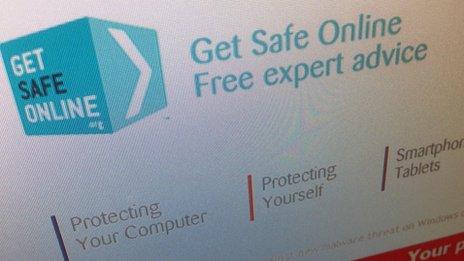Apology for crashed Get Safe Online anti-hack site
- Published

The head of a government-funded cyber-security advice website has apologised and said he was "not sleeping" after the site collapsed under heavy traffic.
Get Safe Online was publicised as being the place to go for advice to protect computers against a high-profile hack.
But within moments of an announcement on Monday, the website collapsed under a deluge of visitors.
Despite extra capacity being added, problems continued well into Wednesday morning.
The incident has called into question the UK's ability to handle a more serious cyber-security crisis.
"It's important for people to realise that this has been a learning curve for us," said Tony Neate, Get Safe Online's chief executive.
Stay protected
"We're looking at what we can do to make sure this won't happen again. We're sorry. I've had no sleep for two days."
Security expert Graham Cluley said the incident "should have been much better handled".
He told the BBC: "Get Safe Online massively dropped the ball.
"If the government is going to rely upon Get Safe Online to distribute internet security advice, the site needs to invest in the infrastructure required to remain accessible at all times, every day of the year, because you never know when the next big security issue will crop up - and when the public will need advice urgently."
'Quadrupled' capacity
Mr Neate said he did not believe the site was itself the victim of a hack attack, as some had speculated.
"There is no reason to say this is a DDoS [distributed denial of service] attack. I'd love to say it was an attack - but it's just the total amount of traffic that's coming in."
He said the site had "quadrupled" its capacity, but access was intermittent on Wednesday, although at the time of writing appeared to have stabilised.
The announcement warning of the Gameover Zeus threat was made by the UK's National Crime Agency (NCA) just before 1400 BST on Monday.
A spokesman for the NCA said Get Safe Online's down time was "disappointing", but noted that the safety information was eventually also copied to the UK's newly established Cyber Emergency Readiness Team (Cert) website.
Get Safe Online is funded by the government as well as the private sector. Its website lists an extensive number of partners and supporters, including PayPal, Barclays and Microsoft.
"The site is backed by the government and industry players," said Mr Cluley.
"The resources should be available to keep the site running even in times of high activity.
"I hope they've learnt their lesson, and that it won't happen again."
Follow Dave Lee on Twitter @DaveLeeBBC
- Published3 June 2014
- Published2 June 2014
- Published3 June 2014